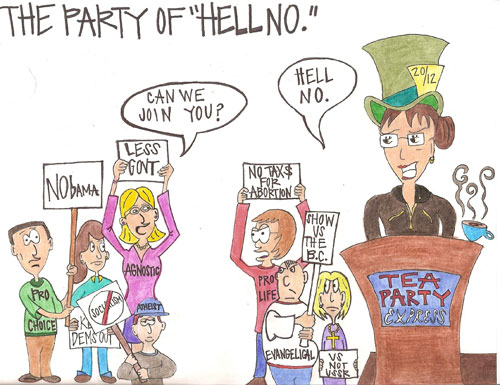By Matthew Boyle | mboyle@flagler.edu
Illustration by Ellen Gambrell
St. Johns River Community College freshman and self-described conservative and agnostic Canyon Molitor finds it difficult to be involved with the local Tea Party movement because he isn’t religious.
Molitor, 18, said other conservatives don’t make him feel welcome among their ranks. He backs conservative and Tea Party views on health care and taxation, but other faith-based conservative issues turn him off.
“I agree with a lot of Republican views except, for instance, abortion,” Molitor said. “Personally, I think it’s wrong but I don’t think anyone else has the right to try to make it illegal or anything like that. Same with legalizing gay marriage — I don’t think it’s right for someone to tell another person they can’t do something.”
In its mission statement, the St. Johns County division of the United American Tea Party says it aims to separate itself from Democrats and Republicans and focus on the issues.
Molitor said he would join if he didn’t feel like some in the group would push their faith-based social views on him.
“With all those things, religion is like the main spear behind it,” Molitor said.
St. Johns County United American Tea Party division founder and organizer BreeLee Johnston said she hopes religious and social differences wouldn’t turn possible Tea Party members away.
“The Tea Party is a conservative movement, not a faith-based movement,” Johnston said.
She said that it is possible, though, that agnostics may reject the Tea Party because of their perception of religious members. She said she hopes Tea Party members, especially leaders, would not preach to non-believers.
Currently, Johnston said the St. Johns County United American Tea Party division has about 400 members on its Web site and about 1,500 members in her database. She said that other than the local Young Republicans club, Tea Party members range in age from mid-30s into late-60s. Johnston hopes agnostics and religious Tea Party members put their social and faith-based differences aside to work toward common goals.

“We’re trying to push for a more informed youth,” she said. “The key word there is ‘informed,’ not ‘brainwashed.'”
Molitor said that even though it may not be blatant, he feels preached to by Tea Party leaders.
“If it wasn’t for Catholicism and the hard Christian behind it [the Tea Party movement], then people wouldn’t be pushing so hard against it,” Molitor said.
Self-described agnostic liberal Olivia Iaquinto, 20, said she doesn’t feel a religious push from the leaders of the left. Iaquinto isn’t politically active, but she said she was a couple of years ago.
“I would go to peace rallies, I would go pretty much wherever I could,” she said. “I voted for the first time in the last election.”
Iaquinto went to anti-war rallies and rallies for migrant farmworkers’ rights.
“At some events I have been to, there have been other protesters like religious protesters like, say, for pro-life and pro-choice rallies,” she said.
Iaquinto said she didn’t feel a religious push or pull at those events.
Flagler College economics major Sam Taylor, 20, thinks that though he’s a Catholic, conservatives and Tea Party leaders focus too much on faith and back their arguments with religion. Taylor, a Libertarian, attended the first St. Johns County United American Tea Party tax day event on April 15, 2009, and felt the Tea Party lost its message.
“It wasn’t what I thought it would be,” Taylor said. “It was more of a conservative reactionary group, which did turn me off quite a bit. I feel like a lot of times, with our generation, we’re kind of forced to choose between having a moderate religious view and also where we’re going politically.”
Johnston said the Tea Party promotes fair taxation, legal immigration and little government intervention, but Taylor saw things differently at the April rally.
“That rally was about a restriction of government and it was about fiscal conservatism, at least from a lot of the promoters and people who were speaking there,” Taylor said. “But, especially from the signs you saw being held and, eventually, a lot more supporters that you see at rallies these days, you see a lot more people saying we’re a Judeo-Christian country and we need to back that up.”
Taylor thinks conservative leaders need to hone in on fiscal issues and cut government spending to regain the trust of today’s youth. He said Republicans and Tea Party leaders lose their message when they approach issues from a religious standpoint.
Taylor sees a union of religion and politics that he said should not be there.
“Even though I’m religious, I do agree with the concept of separation between church and state,” he said. “I don’t think it [religious and political interference] is so much behind the scenes anymore. It used to be but I think when the Tea Party came out, that actually kind of changed things a little bit. It’s more blatant than it was before.”
Taylor and Molitor both want to be involved in conservative politics. They said they won’t, though, until conservative politicians take faith out of decision-making.
“They could definitely tone it down a little bit,” Molitor said. “A lot of times, what you’ll see is, ‘God wouldn’t want this.’ They’ll just bring it full force onto you like a boulder trying to hit you.”
Taylor said, to reach today’s youth, conservative leaders need to focus less on tradition and more on restriction of government.
Molitor wants conservative politicians to stop preaching and start solving problems. He doesn’t want to feel excluded.
“The first thing they need to try to do is level out, make level grounds between two people and then build up,” Molitor said. “I think that they’re saying, ‘these are our level grounds, and we’re trying to pull you up here.'”


Be the first to comment on "Tea Party organizers struggle with faith"